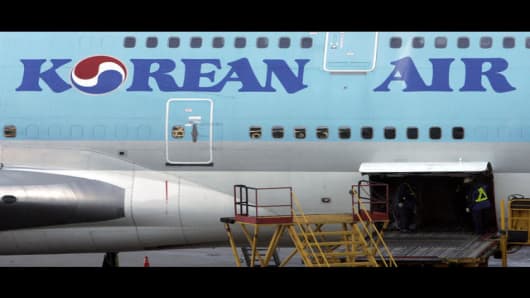Korean Air Lines, South Korea's top air carrier, reported on Thursday its first quarterly operating loss in five years, hit by higher oil prices and slowing demand.
Korean Air is expected to benefit from recent falls in oil and fuel prices in the second half, but its outlook remains clouded by a weaker won and a sluggish global economy, analysts said.
Shares in Korean Air slid over 3 percent, shortly after the earnings announcement, against the wider market's 0.03 percent gain
Korean Air, also the world's largest air cargo carrier, posted a 116.4 billion won ($112 million) operating loss in the second quarter on June 30, smaller than a 166.7 billion won loss forecast by 8 analysts polled by Reuters.
The operating loss was the first deficit since the second quarter of 2003, when Asia's airlines were hurt by an outbreak of Severe Acute Respiratory Syndrome (SARS).
The operating loss compares to a 75.4 billion won profit in the second quarter of 2007 and a 19.6 billion won profit in January-March of this year.
Jet fuel prices jumped 40 percent from the beginning of this year until late July.
Korean Air used 1.2 percent less fuel in the second quarter from a year ago, but spending on fuel, the company's single-biggest cost item accounting for around 40 percent of its operating expenses, surged 80.4 percent.
To help South Korea's airlines cope with higher fuel expenses, the government allowed them to raise surcharges from July.
Skyrocketing oil has rattled airlines worldwide. Cathay Pacific Airways, Asia's No.3 carrier, posted a surprise net loss of $85 million for the January-June period. World No. 2 carrier Singapore Airlines marked a 15 percent fall in second-quarter net profit.
Korean Air also reported a 288.9 billion won net loss during the April-June period, as a weaker won weighed on fuel bills and foreign currency debt servicing costs. The shortfall is narrower than a 382.4 billion won net loss forecast by the Reuters poll.
It compares with a 214.4 billion won loss a year earlier and a 325.5 billion won loss in the previous quarter.
The softer won currency may hurt demand for overseas trips as South Korean travelers tighten their belts and as it boosts the cost of importing fuel.
"Even during this year's summer vacation, I only see single-digit growth in demand, instead of the usual 10 percent rise for the period," said Han Byung-hwa, an analyst at Hyundai Securities.
The South Korean currency fell 8.6 percent against the dollar in the second quarter from a year ago, according to central bank data.
Reflecting the concerns, shares in Korean Air, valued at $3.3 billion, lost 7.9 percent in the second quarter, underperforming a 1.7 percent fall in the wider market.


